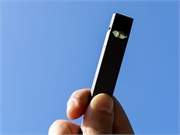Juul Delivers More Nicotine Than Other E-Cigarettes: Study

FRIDAY, Nov. 15, 2019 (HealthDay News) -- Juul electronic cigarettes deliver nicotine at a much higher rate than most other types of e-cigarettes, new research shows.
Juul is by far the leading e-cigarette brand sold in the United States, and is particularly popular among youth.
In the new study, researchers from Penn State University College of Medicine analyzed blood samples from six Juul users who were asked to puff on their device every 20 seconds for 10 minutes -- a total of 30 puffs.
"The Juul users we studied obtained blood nicotine concentrations almost three times as high as most of the e-cigarette users we previously studied," said study first author Jessica Yingst, a research project manager.
In fact, "Juul's nicotine delivery is very similar to that of cigarettes," she said in a university news release.
The Juul users were also asked to rate their withdrawal symptoms and other effects like nicotine craving and anxiety both before and after vaping. They had higher levels of nicotine dependence than more than 3,000 long-term users of other e-cigarettes, according to the study.
Juul Labs did not respond to a request for comment from HealthDay.
Prior studies of other e-cigarette brands with high liquid nicotine concentrations found that many delivered very little nicotine to the user, the researchers noted.
"In previous studies, we found that e-cigarette users were less addicted than smokers. However, the high nicotine delivery of the product and the scores on this study suggest that Juul is probably as addictive as cigarettes," said study co-author Jonathan Foulds, a professor of public health sciences.
The researchers said the high addiction potential of Juul e-cigarettes is a good reason for nonsmokers to avoid them, but they may still offer smokers a less harmful form of nicotine consumption.
"In previous work, we determined that Juul delivered lower levels of some harmful chemicals than cigarettes and even some other e-cigarettes," said study co-author John Richie, a professor of public health sciences.
E-cigarettes pose a dilemma for public health experts, according to Foulds.
"This type of product is likely addictive and is attractive to teenagers," he said. "But those same qualities that make it addictive may enable it to help adult smokers switch to a much less harmful form of nicotine consumption."
In recent weeks, Juul has announced that it would no longer sell mint, fruit or dessert flavors of its products.
The company made these moves as it faces widespread criticism that its flavored nicotine products are hooking a generation of teenagers on nicotine and vaping.
The company also faces multiple investigations by U.S. Congress, the U.S. Food and Drug Administration and several state attorneys general. Juul is also being sued by adults and underage vapers who allege they became addicted to nicotine by using Juul's products.
The study was published Nov. 15 in the journal JAMA Open Network.
More information
The U.S. Centers for Disease Control and Prevention has more on the risks of e-cigarettes for young people.

The news stories provided in Health News and our Health-E News Newsletter are a service of the nationally syndicated HealthDay® news and information company. Stories refer to national trends and breaking health news, and are not necessarily indicative of or always supported by our facility and providers. This information is provided for informational and educational purposes only, and is not intended to be a substitute for medical advice, diagnosis, or treatment.

